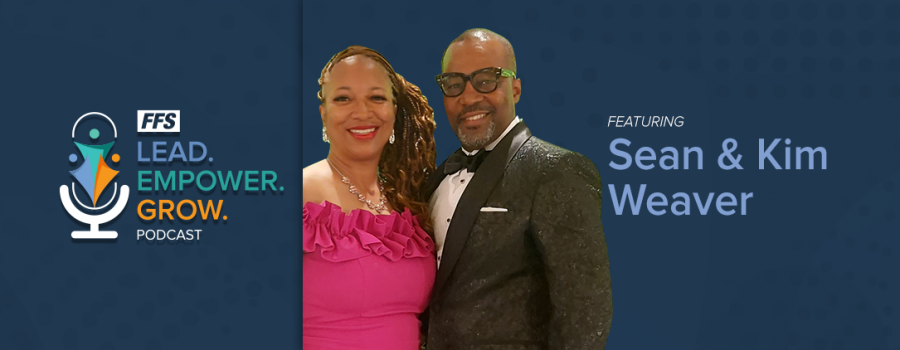Sean and Kim Weaver run their business as the perfect pair: Sean, a pastor, is the people person while Kim, a former engineer, runs the numbers. Together, they protect families from potential hardship by making sure they have the financial solutions they need.
On today’s Lead. Empower. Grow. episode, join us for an interview with the Weavers about how they started in the industry and what drives their business forward.
See below for an excerpt of our conversation — you can listen to the full episode here.
What was the biggest challenge you faced when starting your business?
Kim Weaver: Sean’s a natural at connecting with people, while my background is in analytics and things of that nature. I like problem solving and doing the case design for clients. But building a team and building a business is a different animal. It requires a little bit more than just being able to connect with people.
I think that’s been the biggest challenge. Because it’s hard not to focus on just one or the other: are you going to grow your business by doing your own apps or are you going to develop others, understand the system and go out and repeat it?
Sean Weaver: Absolutely. Yes, you can do well and make a lot of money in this business just writing with your own pen. But if you have a desire to help as many people as possible, then you can only do so much as an individual. If you duplicate yourself — in Charlotte, and Atlanta, and Memphis and all these areas — how many more people can you help reach that security?
It was First Financial Security that really helped me understand that. And another thing that FFS really helped me with was the literacy aspect. It helped me understand the importance of educating people. This business is not just saying, “Hey, here’s a life insurance product; here’s an IUL; here’s an annuity,” but instead giving them financial capability to understand their needs, why they need a product and how best to utilize it. So, we’ve learned to lead with financial literacy.
Would you say the educational aspect is why you got into financial services in the first place?
Sean Weaver: We love having conversations about wealth. We love talking about how to help people create that through life insurance. Most people don’t understand the power of life insurance because they were never taught about it. We learn and share with our clients that 60% of all wealth transference is through the strategic and tactical placement of life insurance. That’s not a person’s 401(k), that’s not their business, that’s not their home — it’s life insurance.
We’ve learned to lead with financial literacy.
Kim Weaver: I would like to share just a little bit more on literacy and how it is such a big component of what we do. Because there is so much that is not being taught at the kitchen table or in schools.
A lot of young people are not really thinking about retirement, but they’re pursuing financial freedom. We like to say it’s the same thing. We try to bring a lot of information and principles and education to our clients about how to accumulate wealth for themselves and future generations, as well as entrepreneurship and all its benefits, including tax deductions.
Financial independence is talked about so much now, but I still feel like many people don’t understand what it looks like or how to achieve it. People are still chasing things like cryptocurrency and all the flashy stuff.
Financial independence is talked about so much now, but I still feel like many people don’t understand what it looks like or how to achieve it.
So, you have started to focus on that younger audience?
Kim Weaver: It became a passion for us to try to reach young adults when they are in college or just coming out of college and making those early financial decisions. A lot can be gained for them. We like to talk about the Wealth Pyramid. The first level is savings and credit; the next is insurance. Before you jump into stocks or crypto, you need to build that foundation.
Sean Weaver: We use this example: if you want to build a house, and it’s a three-story house, you don’t start on the third floor. You need a foundation first.
We like to talk about the Wealth Pyramid. The first level is savings and credit; the next is insurance. Before you jump into stocks or crypto, you need to build that foundation.
Listen to our full conversation with Sean and Kim for more about their business helping young people reach financial security.




